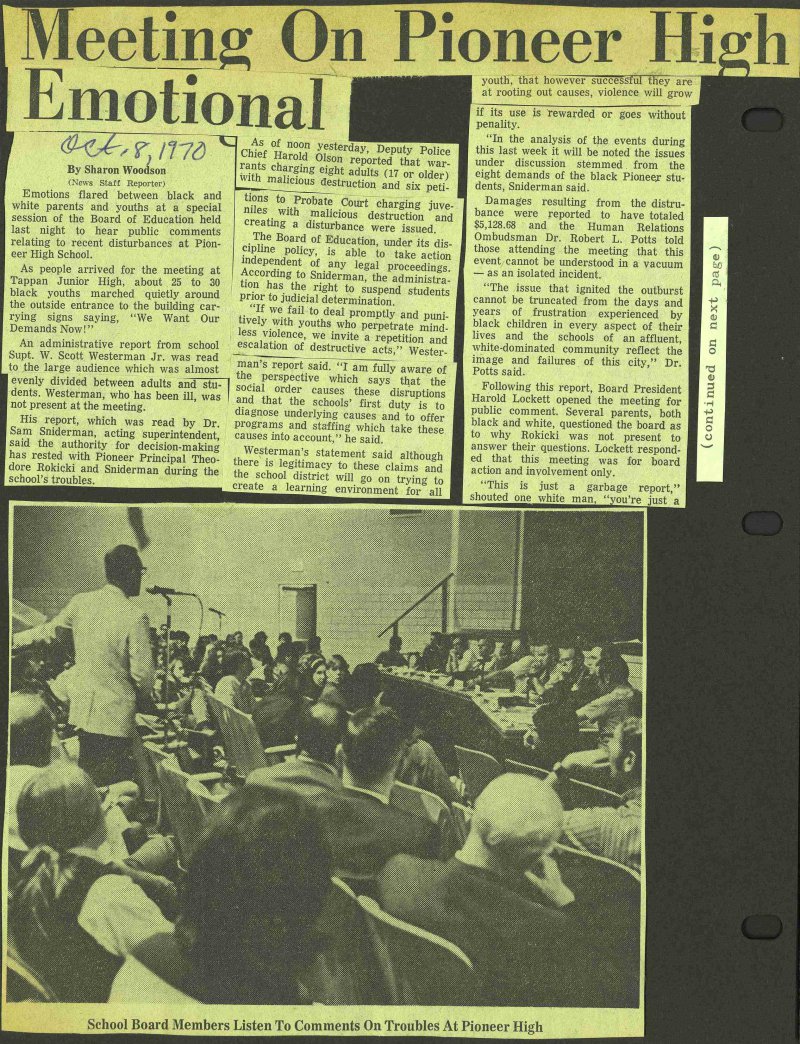Meeting On Pioneer High Emotional


Emotions flared between black and white parents and youths at a special session of the Board of Education held last night to hear public comments relating to recent disturbances at Pioneer High School. As people arrived for the meeting at Tappan Junior High, about 25 to 30 black youths marched quietly around the outside entrance to the building carrying signs saying, "We Want Our Demands Now!" An administrative report frorn school Supt. W. Scott Westerman Jr. was read to the large audience which was almost levenly divided between adults and students. Westerman, who has been ill, was not present at the meeting. His report, which was read by Dr. Sam Sniderman, acting superintendent said the authority for decision-making has rested with Pioneer Principal Theodore Rokicki and Sniderman during the school's troubles. Chief HarnW Sterday' Pole rants % lson rePrted that warLifh f gmg eight Mts (17 or older) th_inalicious_aestruction and six peL iïes withrbar .Courí charging juveniles with mahcious destruction and creatmg a disturbanee were issued cinBOaïd f ?ducation. nder its discipline pohcy, is able to take aetinn Mdependent of any legal píoceedLg? íonCOhdlngtht0 Snidean, the admini Tation has the right to suspend students Pnor to judicial determinaron fivpf WeÍaÍ1 t0 deal PromPÜy and puniüvely with youths who perpétrate mindSalS?ïCef' JVnVite a repetition ad escalation of destructiveacts," j mais reporFlaidTfnTlSiy aware of tne perspective which says that the soöjal order causes these disruptions and that the schools' first duty is to diagnose underlying causes and to offer programs and staffing which take these causes mto account," he said. Westerman's statement said although there is legitimacy to these claims and I the school district will g0 on trying to I ateearning environment for all I I youth, that however successtul they are I at rooting out causes, violence will grow I if its use is rewarded or goes without penality. I "In the analysis of the events during this last week it will be noted the issues under discussion stemmed from the eight demands of the black Pioneer students, Sniderman said. Damages resulting from the distrubance were reported to have totaled $5,128.68 and the Human Relations Ombudsman Dr. Robert L. Potts told those attending the meeting that this event cannot be understood in a vacuüm - as an isolated incident. "The issue that ignited the outburst cannot be truncated from the days and years of frustration experienced by black children in every aspect of their lives and the schools of an affluent, white-dominated community reflect the image and failures of this city," Dr. I Potts said. Following this report, Board President Harold Lockett opened the meeting for public comment. Several parents, both black and white, questioned the board as to why Rokicki was not present to I answer their questions. Lockett I ed that this meeting was for board I action and involvement only. "This is just a garbage report," shouted one white man, "you're just a white honky racist school board." Kenny Hunter, acting president of the Pioneer Black Student Union (BSU), said the blacks at Pioneer are petitioning for a chance to have a real education. He went on to say the black students had requested a meeting with the black faculty which was denied by the principal, and that they could not organize a BSU that would meet during school hours even though many students worked before and after classes. "No one bothered to ask us, the black students, what really happened that day," said Hunter, "and there weren't just blacks involved in the destruction but whites as well." The BSU president told the board several suspended students were not present at the first meeting held in the auditorium when Rokicki warned them of trespassing. He also charged that there were plainclothes pólice "masquerading as social workers," during the time of their meeting. "You can punish those kids if you want to, but who is going to punish the racist people that made all of this happen," questioned one white high school student. Mrs. James Baker, a black parent, asked the board to implement the demands of the students, pointing out that they won't cost them a cent and this would be a very cheap way to accomplish a great deal. Disapproving the actions of the black students, one white parent said, "Why is there always trouble with only the blacks? This didn't just happen, it was a pre-planned thing." Another parent told the audience her son had been punished for being in a fight at the school and she and her husband had to pay for damages. Why shouldn't blacks have to do the same? she asked. "You didn't have to wait for the demands by these students or from public pressure to understand how our schools are racist . . . For once why doesn't this board take some leadership?" asked a woman from the audience. During the meeting about 50 white persons walked out of the auditorium angrily. "That mass exodus illustrates the sickness of racism" said a white man. "We should be looking at this crisis as a vehicle for change." One student claimed three of those walking out were Pioneer High teachers. Mrs. Emma Wheeler, president of the local National Association of Colored People (NAACP), asked that the charges against the blacks be dropped. Trustee Henry Johnson suggested the board obtain an independent agency to determine the cause of the student unrest and racism in the school system. "We as a community have been shucking and jiving our responsibilities. I just hope we can get ourselves together to make education more relevant," he said. The board is expected to meet with suspended students and their parents later this week before a decisión is made on what action will be taken.
Article
Subjects
Sharon Woodson
Pioneer High School
Ann Arbor News
Old News